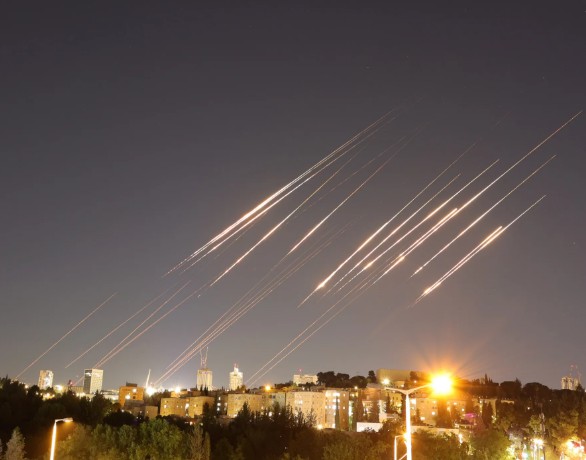The city of Haifa came under direct fire Thursday night as Iran launched a new barrage of missiles and drones toward several key Israeli cities, in one of the most intense attacks since the outbreak of hostilities between the two nations.
According to Israeli emergency services, 20 people were injured in Haifa, including 2 in moderate condition and 18 with minor injuries. The wounded were transported to Rambam Health Care Campus, the region’s main trauma facility, as first responders worked to stabilize the area.
The Israeli military confirmed that Iranian projectiles targeted civilian and industrial infrastructure in Haifa, Tel Aviv, and Beersheba, further escalating the week-long confrontation.
“This was a coordinated and deliberate assault on urban areas,” said IDF spokesperson Brig. Gen. Daniel Hagari. “Iran is attempting to cause mass civilian disruption and terror.”
The Attack: Timeline and Impact
The missile barrage began shortly after 8:30 PM local time, triggering air raid sirens across Israel’s northern and central districts. In Haifa, explosions were reported near the port district, a residential neighborhood, and an industrial site.
Residents reported glass shattering, fires, and visible smoke columns rising above parts of the city.
“It was terrifying. We had just sat down for dinner when the sirens went off,” said Rachel Meir, a local resident. “Then we heard the blasts and our windows shook.”
In Tel Aviv, missiles landed near Givatayim, injuring several and damaging apartment buildings. In Beersheba, another round of strikes caused fires in residential zones already recovering from a prior attack.
Military and Strategic Response
The IDF confirmed it intercepted several missiles using its Iron Dome air defense system, but some projectiles penetrated the shield due to the high volume of incoming fire.
Israeli fighter jets responded within hours, targeting missile launch sites in western Iran, as well as suspected drone storage depots in Iraq and Syria, according to defense sources.
Prime Minister Benjamin Netanyahu called the attack “an act of war” and vowed an “overwhelming response.”
“Iran’s aggression will be met with force. We will not allow our cities to burn,” Netanyahu declared in a televised statement late Thursday.
Ongoing Escalation: One Week of War
The strike on Haifa marks the seventh day of the rapidly intensifying Israel–Iran conflict, which began after Israel struck what it described as Iranian nuclear development sites. Iran retaliated with long-range missile fire, targeting cities and military bases across Israel.
Key Developments So Far:
-
Over 100 civilians injured in Israel in the past week
-
Hezbollah commander killed in Israeli strike in southern Lebanon
-
14 U.S. and German military planes landed in Israel with resupply cargo
-
International calls for a cease-fire have so far been rejected by both sides
Humanitarian and Civilian Impact
In Haifa, dozens of families have been displaced, and city officials are coordinating with the Home Front Command to provide emergency shelter, especially for the elderly and vulnerable.
The Ministry of Health said it has moved emergency personnel to northern hospitals to handle a possible rise in casualties as the attacks continue.
“We are bracing for more. We’re doing everything we can to ensure medical services are ready,” said Dr. Limor Sagi of Rambam Hospital.
International Response and Diplomatic Deadlock
The United Nations, European Union, and several Arab states have renewed calls for restraint. However, U.S. President Donald Trump has refused to push for a cease-fire, instead reiterating support for Israel’s right to defend itself.
Russia and China have condemned the attacks but have not committed to mediating between the parties.



